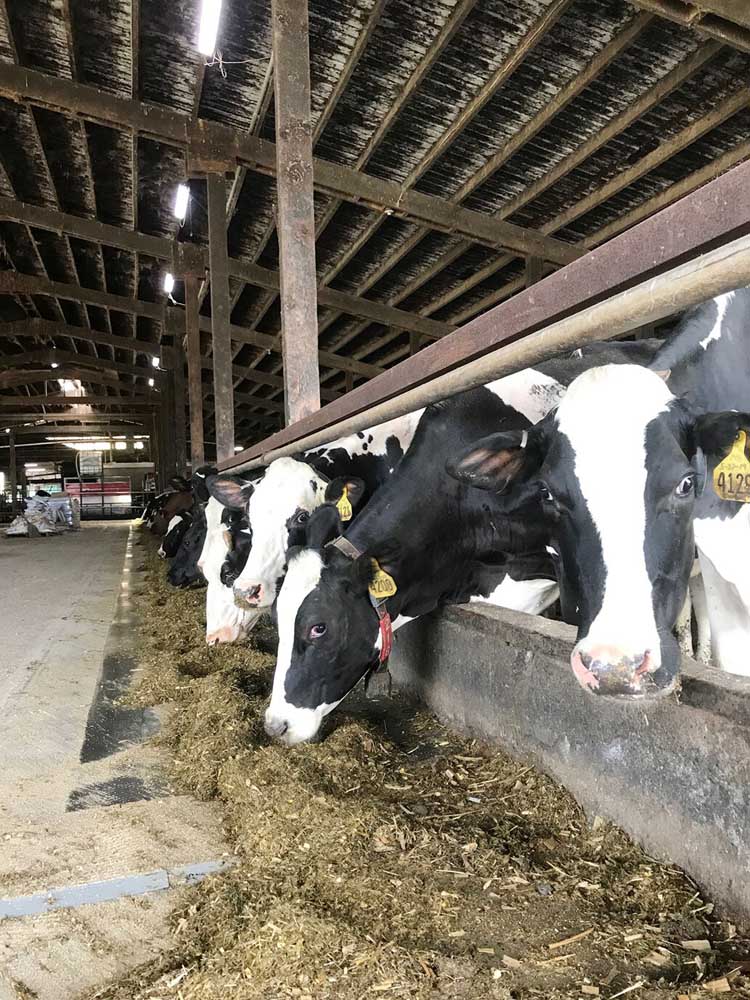Ballot title certified for revived animal cruelty initiative
Published 6:30 am Friday, June 24, 2022

- Holstein cows eat feed inside the dairy barn at Tilla-Bay Farms in Tillamook, on Oregon’s North Coast.
SALEM — A controversial voter initiative in Oregon that would remove exemptions for farming and ranching under the state’s animal cruelty laws is being revived for another run.
Proponents of Initiative Petition 3 — named the Abuse, Neglect and Assault Exemption Modification and Improvement Act — took another step toward qualifying for the 2024 general election after being issued a certified ballot title on June 13.
IP3 is essentially a reboot on Initiative Petition 13, which was filed last year for the 2022 election. It calls for amending Oregon’s animal abuse and neglect statutes, abolishing longstanding exemptions for agriculture.
The result would make it a crime to slaughter livestock for food, while also banning common animal husbandry practices such as branding and dehorning cattle. Artificial insemination would furthermore be considered sexual assault of an animal, a Class C felony.
Exemptions for hunting, fishing, rodeos, pest control, scientific research and wildlife management would likewise be stripped away under the the proposal.
According to the “Yes on IP3” campaign website, the laws would retain exemptions for killing or injuring animals in cases of self-defense and providing veterinary care.
David Michelson, a Portland-based animal rights activist and lead organizer for the campaign, said IP13 failed to garner enough signatures for the 2022 ballot because, “unlike the claims some have made that we receive funding from the likes of (George) Soros or (Bill) Gates, this is a very grassroots initiative that had started with very few team members.”
“Since we started this process in November 2020, we have steadily grown in support and are hopeful of our chances for qualifying in 2024,” Michelson said in response to questions emailed by the Capital Press.
Petitioners filed IP3 on March 16. It is largely the same as IP13, but with two additions, Michelson said.
First, he said IP3 would remove additional exemptions for livestock and farmed animals under animal neglect statutes requiring they have access to “adequate bedding, adequate shelter and other minimum care provisions.”
Second, the initiative would make it so that anyone convicted of animal cruelty could not own any animal for 5-15 years, depending on the severity of the crime.
While the attorney general did certify the ballot title for IP3, supporters are not yet approved to start circulating the petition. Those who commented on the draft ballot title for IP3 may appeal the certified title to the Oregon Supreme Court. Appeals are due June 28.
If approved, the campaign would need to collect 112,020 signatures to place IP3 on the 2024 ballot.
As it was with IP13, farming, ranching and hunting groups fiercely oppose the measure and are preparing to push back against it.
Tami Kerr, executive director of the Oregon Dairy Farmers Association, said IP3 would put dairies and cattle producers out of business, hurting rural communities statewide.
“I know how hard our producers work, my family included. It’s personally offensive,” Kerr said. “As crazy as this is, and as negative as it would be to our rural communities, I would hope that a lot of our elected officials would speak out in opposition to it, our state senators included.”
Cattle and calves ranked as Oregon’s second-most valuable agricultural commodity in 2020, worth approximately $587.8 million. Milk ranked as the fourth-most valuable agricultural commodity, at $557.3 million.
“We love our local food,” Kerr said. “We have award-winning products all over the state that this would have a negative impact on.”
Michelson said the campaign recognizes the need for economic security, sustenance and self-reliance in rural Oregon. He suggested that current subsidies for animal agriculture may be redirected to help farmers transition to other plant-based crops, or providing farmers with a universal basic income or guaranteed jobs program.
“We believe a world can exist where both human and nonhuman animals can co-exist without relying on the violation of one another’s basic right to life,” Michelson said. “There are many different strategies we can use to get to that world, and I do not think there is only one good solution.”
Once successful in Oregon, campaign leaders say they hope to see similar initiatives introduced in all 50 states.





